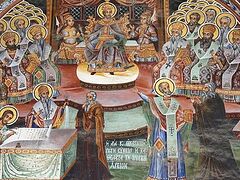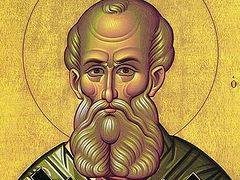We Christians are truly blessed to profess the true Orthodox faith! As the Apostle Paul says, For by grace you have been saved through faith; and that not of yourselves, it is the gift of God (Ephesians 2:8). Indeed, our faith is a divine gift, brought to us from heaven by our Savior, Jesus Christ! Before the coming of Jesus Christ, people did not know the true God and walked in the darkness of ignorance. After the flood, most people forgot God to such an extent that they began to worship many gods. Instead of the one true God, they venerated various creations of God; for example, they worshiped the heavenly bodies—the sun, the moon, and the stars. They deified humans, revered domestic animals as gods, worshiped various wild beasts and even reptiles, and ultimately prayed to all kinds of depictions of objects—idols.
The doctrines of paganism were so abhorrent to God that they even involved human sacrifices to their gods. Such was the spiritual blindness and ignorance that engulfed humanity at that time. The faith in the true God was preserved only among the chosen people of God—the Jews. But even among them, very few were true worshippers of the Almighty God. These were the patriarchs, prophets, and others who pleased God with their faith and life. The rest of the Jews vacillated between true faith in God and constant lapses into idolatry. They often reduced all piety and godliness to mere ritual observance and external sanctity.
Generally speaking, before the birth of Christ, people forgot God and indulged in wayward passions and sinful, sensual pleasures.
But then, from Bethlehem, the Sun of Righteousness, Christ our God, began to shine, and the rays of this Sun reached all corners of the world. The Gospel teaching was spread across the earth by Christ’s apostles—humble, uneducated, and modest fishermen. And what did we see then and continue to see now? Wherever the benevolent light of Christ penetrates, everything in people changes. Gross misconceptions are dispelled, harsh manners are softened, pure and elevated concepts of God and humanity are established. Lawfulness is instituted, and prosperity flourishes in homes and human societies.
Such are, in general, the fruits of the Christian faith proclaimed by Jesus Christ.
How can one possibly describe the benevolence of the Christian faith and enumerate all the blessings it bestows upon humanity? Consider the personal life of an individual. Should one suffer the loss of a home or property, or be struck by illness or another misfortune, the holy faith teaches us that God is chastening us for our sins, urging us towards repentance and the amendment of our lives. If we lose loved ones dear to our hearts—an unbearable, overwhelming grief! How can this sorrow be alleviated? Let us turn to God, in whom we believe, and pour out our prayerful tears with faith and hope, believing that the Lord of life and death will reward them with a better life and grant us the grace to see them again, alive and immortal.
In the end, holy faith works miracles. What can’t those who truly believe, strengthened by the power of God, accomplish? All believers can perform miracles, for faith is like a hand by which one receives God’s power and accomplishes deeds beyond natural human abilities. The Savior said, He that believeth on me, the works that I do shall he do also (John 14:12); All things are possible to him that believeth (Mark 9:23). Indeed, the history of the Christian Church is filled with countless and astonishing examples of the miraculous power of faith. One such example is found in the life of St. Sylvester, Pope of Rome.
St. Sylvester was the bishop in Rome during the blessed reign of Constantine the Great, who brought peace to the Christian Church and protected it from the assaults of Jews and pagans. Yet, the age-old struggle of Christianity against its enemies did not cease within the Christian communities, even after the external prosperity of the Church had been secured. These adversaries, once wielding fire and sword, now sought to use more subtle, sharp, and penetrating weapons—words—hoping to shake the minds of faithful Christians with crafty arguments and vain rhetoric.
In Rome, during the episcopacy of St. Sylvester, a public debate was arranged by the Jews, in the presence of Emperor Constantine and his mother Helena. This debate demonstrated the grace-filled power of the name of Christ. Zambri, a famous and reputedly wise rabbi among the Jews, argued with St. Sylvester using the Old Testament Scriptures. However, being clearly defeated by the undeniable testimonies of the Scriptures about Christ, he proposed to demonstrate the power and superiority of his Jewish faith through action. He claimed that to him had been revealed the divine name, powerful and dreadful, which no human nature could endure without falling dead upon hearing it. Zambri challenged them to bring any animal, even the fiercest one, and promised that as soon as he whispered the divine name into its ear, it would instantly die. They brought a wild ox, and Zambri indeed caused its immediate death by whispering some words over it.
The Jews celebrated their triumph, but St. Sylvester addressed them, saying, “In the sacred books, the Lord Himself says, I kill and I make alive: I wound, and I heal (Deuteronomy 32:39). If Zambri truly killed by the name of God, let him revive the animal by the same name, for God in His essence is All-Good and turns even evil into good.” Here the contrast and vanity of the Jewish faith compared to the Christian faith were fully revealed. Zambri could not manifest the grace-filled power of the divine name because he acted not by it, but by the power given by the evil one for his sorcery. St. Sylvester, on the other hand, was endowed with the grace-filled power of God and did not hesitate to demonstrate it to all. After offering a prayer to the Lord Jesus aloud, the holy bishop revived the ox and thereby solemnly testified to the benevolence of the Christian faith before all.
From this example, we understand that we Christians now live in days of God’s favor, For ye are not under the law, but under grace (Romans 6:14). Therefore, we should not feel bound by the yoke of servile fear in our relationship with God. Instead, we should live as beloved children of God, with full assurance that all things work together for good to them that love God (Romans 8:28), and that it is unbecoming of a Christian to harbor any superstitious fear of created beings, having such a mighty protection in the great and name of Jesus, worthy of all worship. Whatever unexpected misfortune may befall us, whatever evil circumstance may burden us, whosoever shall call upon the name of the Lord shall be saved (Romans 10:13).
There is only one thing we must fear above all: that through our unbelief or unrighteous life, we might lose the grace-filled help of the Lord. Therefore, Let every one that nameth the name of Christ depart from iniquity (2 Timothy 2:19), and let the name of God be hallowed in our lives. Then, the invincible power of the name of the Lord Jesus, invoked in our prayers with faith, will not depart from us.




